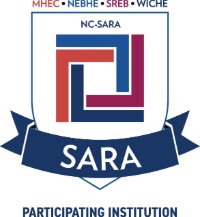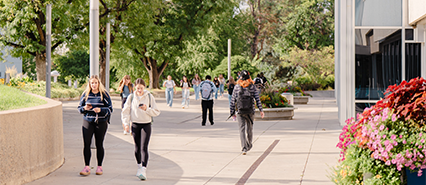State Authorization
CSU Pueblo seeks to comply with nationwide and all state authorities' requirements to maximize students' educational opportunities and to protect their educational investments.
Federal Compliance
Colorado State University Pueblo receives Title IV funds under the Higher Education Act of 1965 and is, therefore, required to comply with regulations regarding distance education. These regulations require postsecondary institutions to obtain authorization from states and U.S. territories outside of their Home State in order to deliver educational experiences there. The authorization may come directly from the other state or through a state authorization reciprocity agreement.
State Authorization Reciprocity Agreement
CSU Pueblo has been approved by the Colorado Department of Higher Education to participate in the National Council for State Authorization Reciprocity Agreements (NC-SARA) through the Western Interstate Commission on Higher Education. Through CSU Pueblo’s voluntary participation in NC-SARA, the institution is able to deliver educational experiences outside of Colorado. SARA oversight includes distance education, out-of-state placements, professional licensure, and consumer protection. Additional details follow and are also available here.

-
NC-SARA
CSU Pueblo has been approved by the Colorado Department of Higher Education to participate in the National Council for State Authorization Reciprocity Agreements (NC-SARA) through the Western Interstate Commission on Higher Education. Through CSU Pueblo’s voluntary participation in NC-SARA, the institution is able to deliver educational experiences outside of Colorado. SARA oversight includes distance education, out-of-state placements, professional licensure, and consumer protection. Additional details follow and are also available in the SARA Policy Manual.
-
Distance Education
Distance education is defined as instruction offered by any means where the student and faculty member are in separate physical locations. It includes, but is not limited to, online, interactive video, and correspondence courses or programs. Institutions participating in SARA report the number of exclusively distance education students enrolled, disaggregated by state, territory, or district in which the learning activity is taking place. This includes both degree and non-degree for-credit courses. These data are reported annually to NC-SARA in the spring and include the previous fall’s enrollment data, which institutions have reported to the federal government’s Integrated Postsecondary Education Data System (IPEDS).
-
Out-of-State Learning Placements
Out-of-State Learning Placements include, but are not limited to, clinical rotations, internships, or student teaching offered by CSU Pueblo outside of Colorado. Institutions participating in SARA annually report the numbers of their students participating in learning placements disaggregated by state, territory, or district and the two-digit Classification of Instructional Programs (CIP) codes as assigned by the U.S. Department of Education.
-
Professional Licensure
Professional Licensure is defined a process of State or other governmental entities that establishes standards of practice and gives legal permission to practice a profession by providing licenses or certifications to individuals who meet those standards. Students who successfully complete a licensure preparation program at CSU Pueblo will be prepared to pursue licensure in states in which departments have determined CSU Pueblo's program meets that state's requirements.
Some professions (e.g. teachers, social workers, nurses, etc.) require state licensure or certification, in addition to your degree, to hold a position in that field. Professional licensure regulations and requirements vary from field to field, and from state to state. Each state and U.S. territory has an authority, be it public or private, that is responsible for overseeing the licensure requirements of the various professions in that state.
For students enrolling in a program that leads to a professional licensure that is required for employment, CSU Pueblo strongly recommends you work with your advisor and/or department or program throughout your time at CSU Pueblo to make sure you complete the educational requirements necessary to sit for the licensing exam and that you are able to identify any other items beyond your education that may be required by the particular state or territory in which you are physically located. You can review the list of professional licensure programs offered and the states/territories where, upon completion of your degree, they would be eligible for the licensure exam, at any time on this webpage. Please note, the successful completion of a program at CSU Pueblo does not guarantee licensure, certification, or employment in an occupation. CSU Pueblo shall not be held liable if a student is unable to qualify for licensure or certification in any jurisdiction. For students studying engineering, geology, or accounting: while a professional license is not regularly required for these fields, it is in your best interest to discuss your future plans with your advisor and program director to determine if licensure upon graduation is something you might pursue.
CSU Pueblo has determined each of its licensure program’s requirements to meet or not meet the educational requirements to be eligible for licensure in each U.S. state and territory. That report can be found here with all disclosure statements, links to each state’s licensure board, and the primary contact by program.
To further assist, NC SARA created and maintains a current Professional Licensure Directory and a list of specialized accrediting agencies that can provide guidance on professional licensure. -
Where can I learn more about professional licensure?
This program is one that requires professional licensure. Professional licensure regulations and requirements vary from field to field, and from state to state. Each state and U.S. territory has an authority that is responsible for overseeing the licensure requirements of the various professions in that state. To learn more about licensure requirements for this program, please visit CSU Pueblo’s State Authorization webpage here.


